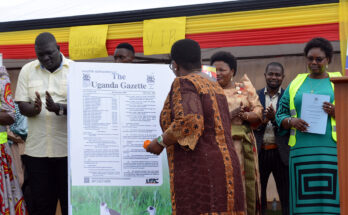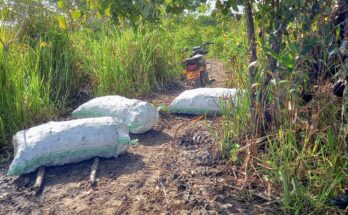PHOTO: African climate activists protest at the COP27 in Sharm el-sheikh, Egypt. PHOTO BY JOHN OKOT
Uganda has said it has begun implementing a 10-year-restoration program to ‘compensate’ for the potential damage due to carbon emissions from the monstrous East Africa Crude Oil Pipeline (EACOP) in the future. But experts have straight away poked holes at the initiative, stating that its efficacy remains wanting towards reaching global climate goals.
Last week at the COP27 in Sharm el-sheikh, Uganda’s State Minister of Water and Environment, Beatrice Anywar, revealed that the government had reached an agreement with the Finance Ministry to fund the program. She was, however, cagey on how much was budgeted for the initiative.
“The issue of funding was delaying us,” Anywar said, adding that “but I am glad it has been resolved – and the 10-year-program is finally coming to life”.
“A carbon bomb”
The Uganda government has been at the centre of controversy over its firmness towards completing the world’s longest heated oil pipeline despite calls from the European Union Parliament to halt the five-billion-dollar project. The 1,443 km oil pipeline will transport crude oil from Kabale, Hoima in western Uganda, to the Chongoleani peninsula, along the Tanzanian coast on the Indian Ocean.
Across the globe, there have been major campaigns to defund the EACOP project. Some institutions, however, are still financing the EACOP, which remains a major sticking point in the fight against fossil fuel expansion, activists say.
For now, as Uganda waits to benefit from the oil pipeline, Anywar noted, the government will raise taxes, especially on petroleum products, as sources of revenue for investing in renewable energy projects.
Recently, Uganda’s president, Yoweri Museveni, slammed the western world for ‘making a mockery’ of climate targets, after many European nations revived coal-based energy as an alternative to Russian energy. In September, Russia halted gas supplies to European countries after sanctions, forcing many European countries, which depended on Russian gas and oil, to scamper for alternatives in the global south.
But experts have described fossil fuel projects, like the EACOP, as a ‘carbon bomb’ that would be detrimental to reaching climate goals; and by calculations, the experts say, the impact of the EACOP– after burning and transporting the extracted oil – will generate 34 million tonnes of carbon each year thus increasing Uganda’s annual emissions by a factor of seven. Uganda’s carbon emissions have had a steady rise increasing from 53,000 tonnes of carbon in 2005 to close to 90,000 in 2015
“It’s going to take us backward in our fight against fossil fuel,” said Tzeporaah Berman, a Canadian climate activist, who called upon counties to agree on the non-proliferation treaty that will explicitly stop the expansion of fossil fuel exploitation and manage a just transition away from coal, oil, and gas to clean energy.
She added, “there is some progress” in their efforts though, adding that more than 300 scientists have also joined the call for the non-proliferation treaty to address the root cause of the climate crisis.

But the EACOP project, Anywar said, is there to stay, arguing that it would boost Uganda’s revenue streams for future investment in renewable energy since western nations are yet to fulfill their 100 billion a year pledge for climate action in the developing world.
“They (developed nations) have destroyed our environment and they are refusing to pay us for the damage,” Anywar said. “Now we are looking for our solutions too”.
Last Sunday, after extended talks at the COP27, a breakthrough agreement to provide “loss and damage” funding – for the vulnerable countries, like Uganda, that are often hit hard by climate disasters – was reached. While the new fund will see that developed countries contribute to saving lives and livelihoods from climate shocks as well as recommit to keeping the ambitious 1.5 degrees Celsius alive, there was no clarity on the terms of funding arrangements. Much of the heavy lifting, especially on how much each country will contribute to the collective, was saved for later.
Regardless, according to Anywar, the oil exploration will continue since the restoration program will focus on eco-friendly practices such as reforestation along the EACOP areas. So far, she said, 20,000 forest rangers have been trained and are set to begin work in the next financial year.
Experts are not convinced
However, experts – and even some government technocrats- look at the reforestation program around the oil pipeline as a sticking plaster while others are doubtful of its long-term impact on combating carbon emissions.
“Planting trees along the oil pipeline would not be a good idea in this situation,” said Tom Obong, the Executive Director of the National Forestry Authority.
“The oil pipeline needs a right of way for easy operation, or else the tree roots can easily invade, or cause shrinkage of the soil where the foundation of the pipeline is. This is not good in the long run”.
Dr. Eric Danso, a forestry expert, says despite being a good initiative, it would fall behind in sucking in the excessive amount of carbon emissions from the oil pipeline.
“[This initiative] is not enough to decarbonize in the long run,” he said. “We need green solutions that would move us away from over-relying on fossil fuel use”.
Belinda Okungu, the Gender Adviser at the Pan African Climate Justice Alliance (PACJA), fears that women, who constitute eight percent of the climate sensitive-sectors like agriculture, will suffer more due to the negative impacts of climate change, such as extreme temperature and erratic rainfall if fossil fuel project continues to expand.
“Across the globe, studies show that women experience the greatest impacts of climate change which poses unique threats to their livelihoods, health, and less access to natural resources despite being the most dependent on them” she added.




